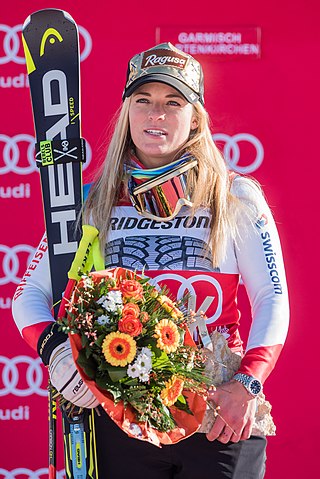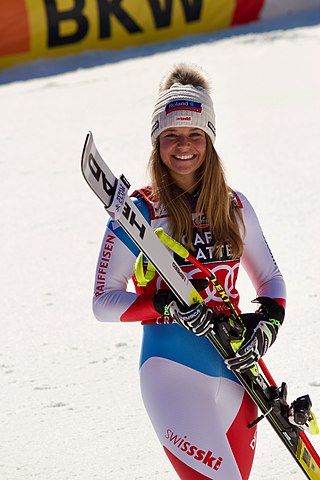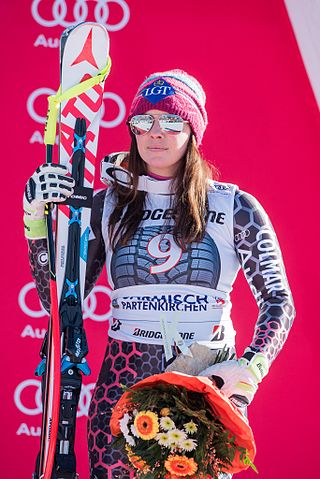
The women's downhill competition in the 2005 FIS Alpine Skiing World Cup involved eight events, including the World Cup season finals in Lenzerheide, Switzerland. In the finals, generally only the top 25 racers in the discipline are eligible to compete, and only the top 15 finishers receive points.

The 49th World Cup season began on 25 October 2014, in Sölden, Austria, and concluded on 22 March 2015 at the World Cup finals in Meribel, France. The defending overall champions from the 2014 season - Marcel Hirscher and Anna Fenninger, both of Austria, defended their titles successfully. The season was interrupted by the World Championships in February, in the United States at Vail/Beaver Creek, Colorado. Combined events were not awarded as a discipline trophy.

The International Ski Federation (FIS) Alpine Ski World Cup was the premier circuit for alpine skiing competition. The inaugural season launched in January 1967, and the 2018–19 season marks the 53rd consecutive year for the FIS World Cup.

The International Ski Federation (FIS) Alpine Ski World Cup, the premier circuit for alpine skiing competition, began in January 1967, and the 2019–20 season marked the 54th consecutive year for the FIS World Cup. As it had every year since 2006, the season began in Sölden, Austria in October. The season was supposed to end with the World Cup finals in March, which were to be held in Cortina d'Ampezzo, Italy for the first time since they began in 1993, but the finals were cancelled due to the COVID-19 outbreak in Italy.

The International Ski Federation (FIS) Alpine Ski World Cup was the premier circuit for alpine skiing competition. The inaugural season launched in January 1967, and the 2020–21 season marked the 55th consecutive year for the FIS World Cup. As it had every year since 2006, the season began in Sölden, Austria in October, and it ended with the World Cup finals in March, which were held in Lenzerheide, Switzerland. However, the COVID-19 pandemic forced many changes to the original racing schedule. Among them were the following:

The women's downhill in the 2021 FIS Alpine Skiing World Cup consisted of seven events. The original schedule had called for eight downhills, but the World Cup finals race was canceled.

The women's super-G in the 2021 FIS Alpine Skiing World Cup consisted of 6 events, with one cancellation from the scheduled seven. Swiss skier Lara Gut-Behrami won four of the first five Super-Gs to establish an 195-point lead over Swiss teammate and defending discipline champion Corinne Suter with only two races to go, and she clinched the discipline title for 2021 after the sixth event, which turned out to be the last one for the season.

The men's giant slalom in the 2021 FIS Alpine Skiing World Cup involved ten events, as scheduled.

The men's downhill in the 2020 FIS Alpine Skiing World Cup consisted of nine events, with only one cancellation from the scheduled ten.

The women's super-G in the 2020 FIS Alpine Skiing World Cup involved 6 events, which produced six different winners from five different countries.

The Women's Combined in the 2020 Alpine Skiing World Cup involved two events, although four had been scheduled. A combined at Val d'Isère, France on 22 December 2019 was cancelled due to heavy snowfall, which forced the downhill scheduled for the day before to be shifted back a day, and a combined at La Thuile, Italy on 1 March was also cancelled due to heavy snowfall the challenge in rescheduling during the COVID-19 pandemic.

The International Ski Federation (FIS) Alpine Ski World Cup was the premier circuit for alpine skiing competition. The inaugural season launched in January 1967, and the 2021–22 season marked the 56th consecutive year for the FIS World Cup.

The women's downhill in the 2022 FIS Alpine Skiing World Cup consisted of nine events including the finals. Defending champion Sofia Goggia of Italy, who won four of the five downhills in which she competed in 2020-21, continued her domination in 2021-22 by again winning four of the first five downhills. Goggia took a commanding lead in the discipline after American Breezy Johnson, who finished second in each of the first three downhills, missed the rest of the season with a knee injury. Goggia then suffered her own knee injury, including a broken bone and ligament tears, while training for the last downhill prior to the 2022 Winter Olympics, but she was able to continue competing within a month and, after all but the final race of the season, had such a commanding lead that only one other competitor even had a theoretical possibility of overtaking her. At the finals, Suter failed to score, and Goggia won her second consecutive discipline championship.

The women's downhill in the 2023 FIS Alpine Skiing World Cup consisted of nine events, including the final. The original schedule called for eleven events, but the first two races of the season scheduled for 5 and 6 November 2022 in Zermatt/Cervinia, were canceled due to adverse weather conditions; the FIS decided not to reschedule them. Once the season began, a downhill scheduled in St. Anton on 14 January had to be converted into a Super-G due to the inability to hold a pre-race training run on either of the two days prior to the downhill. However, a subsequent Super-G scheduled at Cortina d'Ampezzo was converted into a downhill, restoring the original schedule.

The women's super-G in the 2023 FIS Alpine Skiing World Cup included eight events, including the final. The original schedule called for nine events, but a scheduled downhill at St. Anton on 14 January was converted to a super-G due to the inability to hold pre-race practice runs on either of the two days prior to the event. A later super-G at Cortina was converted into a downhill to restore the original schedule balance, but then a downhill at Crans Montana on 25 February had to be delayed a day due to fog and dangerous course conditions, and the super-G previously scheduled for that day was cancelled and not rescheduled.

The women's downhill in the 2019 FIS Alpine Skiing World Cup involved eight events, including the season finals in Soldeu, Andorra. Defending discipline champion Sofia Goggia of Italy fractured her ankle prior to the start of the season and missed five of the eight events, ending her chances to repeat. In addition, 2018 runner-up Lindsey Vonn of the USA, who had closed the prior season by winning all of the final four downhills and needed only four more victories to equal Ingemar Stenmark's all-time World Cup victory record, began the season injured and announced her planned retirement at the end of the season, but was hampered during her comeback by her cumulative injuries, and finally retired immediately after the conclusion of the 2019 World Ski Championships.

The women's downhill in the 2018 FIS Alpine Skiing World Cup involved eight events, including the season finale in Åre, Sweden. Before the start of the season, defending discipline champion Ilka Štuhec of Slovakia suffered a season-ending injury. Ultimately, the discipline title ended up as a battle between oft-injured eight-time discipline champion Lindsey Vonn of the USA and rising Italian skier Sofia Goggia. Through five races, Goggia had a 63-point lead over Vonn, who had been hampered with an injury at the start of the season. Vonn won all of the last three races, earning 300 points. .. but Goggia finished second in all three, earning 240 points, to hang on to a three-point victory for the season title.

The women's super-G in the 2018 FIS Alpine Skiing World Cup involved eight events, including the season final in Åre, Sweden. Defending discipline champion Tina Weirather from Liechtenstein, daughter of 1978 and 1980 overall World Cup women's champion Hanni Wenzel and 1979 men's World Cup men's downhill discipline champion Harti Weirather, won the first race of the season and then held the lead in the discipline all season, with only two-time discipline champion Lara Gut in close pursuit until the finals.

The Women's Combined in the 2017 FIS Alpine Skiing World Cup involved three events, first a super-combined, and then two Alpine combined. Downhill champion Ilka Štuhec of Slovenia won the super-combined and held on to win the season championship. Interestingly, in only her second race in the combined discipline ever, overall World Cup champion Mikaela Shiffrin won the final race.

The women's downhill in the 2024 FIS Alpine Skiing World Cup is currently scheduled to consist of nine events, including the final. The tentative schedule called for eleven events, but a new event, the team combined, which was scheduled for 16 February 2024 in Crans Montana, was cancelled and converted into an additional downhill on the final schedule, increasing the planned schedule to twelve. However, as discussed below in the season summary, cancellations reduced that number during the season.














